最全面人教版八年级上册英语第一单元知识点归纳总结
人教版八年级英语上册第一单元知识点总结
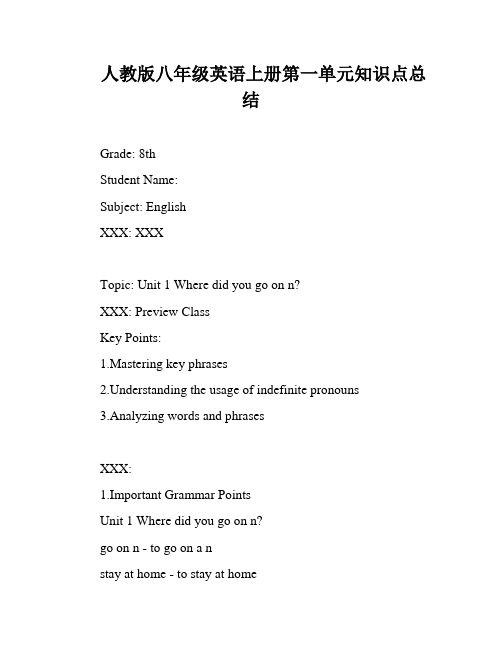
人教版八年级英语上册第一单元知识点总结Grade: 8thStudent Name:Subject: EnglishXXX: XXXTopic: Unit 1 Where did you go on n?XXX: Preview ClassKey Points:1.Mastering key phrases2.Understanding the usage of indefinite pronouns3.Analyzing words and phrasesXXX:1.Important Grammar PointsUnit 1 Where did you go on n?go on n - to go on a nstay at home - to stay at homego to the mountains - to go mountain climbing go to the beach - to go to the beachvisit museums - to visit museumsquite a few - quite a lotstudy for - to study formost of the time - most of the timetaste good - taste goodhave a good time - to have a good timefeel like - to feel likego shopping - to go shoppingwalk around - to walk aroundbecause of - because ofone bowl of - one bowl ofthe next day - the next dayfind out - to find outgo on - to continuetake photos - to take photossomething important - XXXup and down - up and downcome up - to come upbuy sth。
人教版八年级英语上册知识点总结归纳
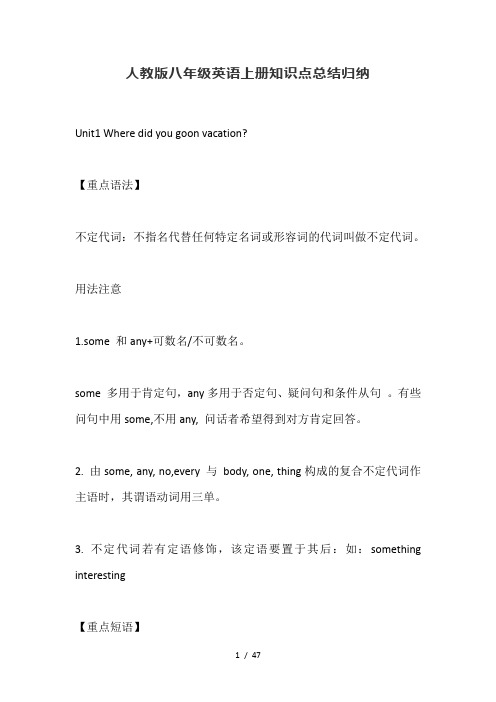
人教版八年级英语上册知识点总结归纳Unit1 Where did you goon vacation?【重点语法】不定代词:不指名代替任何特定名词或形容词的代词叫做不定代词。
用法注意1.some 和any+可数名/不可数名。
some 多用于肯定句,any多用于否定句、疑问句和条件从句。
有些问句中用some,不用any, 问话者希望得到对方肯定回答。
2. 由some, any, no,every 与body, one, thing构成的复合不定代词作主语时,其谓语动词用三单。
3. 不定代词若有定语修饰,该定语要置于其后:如:something interesting【重点短语】1. buy sth for ab./ buy sb. sth 为某人买某物2. taste + adj. 尝起来……3. nothing...but + V.(原形)除了……之外什么都没有4. seem + (to be) + adj 看起来5. arrive in + 大地方/ arrive at + 小地方到达某地6. decide to do sth. 决定做某事7. try doing sth. 尝试做某事/ try to do sth. 尽力做某事8. enjoy doing sth. 喜欢做某事9. want to do sth. 想去做某事10. start doing sth. 开始做某事=begin doing sth.11. stop doing sth. 停止做某事区分:stop to do sth. 停下来去做某事12. dislike doing sth. 不喜欢做某事14. so + adj + that + 从句如此……以至于……16. tell sb. (not) to do sth. 告诉某人(不要)做某事17. keep doing sth. 继续做某事18. forget to do sth. 忘记去做某事/ forget doing sth 忘记做过某事【词语辨析】1. take a photo/ take photos 拍照quite a few+名词复数“许多…”2. seem + 形容词看起来…... You seem happy today.seem + to do sth. 似乎/好像做某事I seem to have a coldIt seems + 从句似乎..…. It seems that no one believe you.seem like ... 好像,似乎….. It seems like a good idea.3. arrive in +大地点= get to= reach+地点名“到达......”arrive at +小地点(注:若后跟地点副词here/there/home, 介词需省略,如:arrive here; get home)4. feel like sth 感觉像…feel doing sth. 想要做某事5. wonder(想知道)+疑问词(who, what, why)引导的从句。
人教版八年级英语核心语法考点归纳

人教版八年级英语核心语法考点归纳八年级上册Unit 1考点一:复合不定代词复合不定代词由some, any, no, every 与one, body, thing 构成。
在使用复合不定代词时应注意以下几点:1. some- 一般用于肯定句中,any- 一般用于否定句或疑问句中,在表示请求、建议或期望得到肯定回答时,常用some- 构成的复合不定代词;2. 复合不定代词作主语时按单数看待;3. 形容词或else 修饰复合不定代词的时候应后置。
考点二:一般过去时定义:一般过去时表示过去某个时间发生的动作或存在的状态,也可表示过去经常发生的习惯性的动作或行为。
结构:主语+ 动词过去式+ 其他;主语+was / were + 其他。
常用时见壮语:yesterday, two years ago, last week, just now 等。
1.The old man _____ in Shanghai, but he _____ in Haikou now.A.be born; liveB.was born ; liveC.is born; livesD.was born; lives2. —Where were you last Saturday?—I ____ in the Capital Museum.A. amB. will beC. wasD. have been八年级上册Unit 2考点一:拼读副词频度副词表示动作或行为发生的频率。
常见的频度副词及其发生的频率如下表:考点二:how 疑问词组练一练3.()do you usually go to school,Simon? -by bike.A.WhenB.HowC.WhatD.Where(答案在文末获取)八年级上册Unit 3考点一:形容词和副词的比较级形容词和副词的比较能表示两者之间的比较关系,表示A 比B 更……,通常用than 来连接。
人教版英语八上unit1知识点归纳
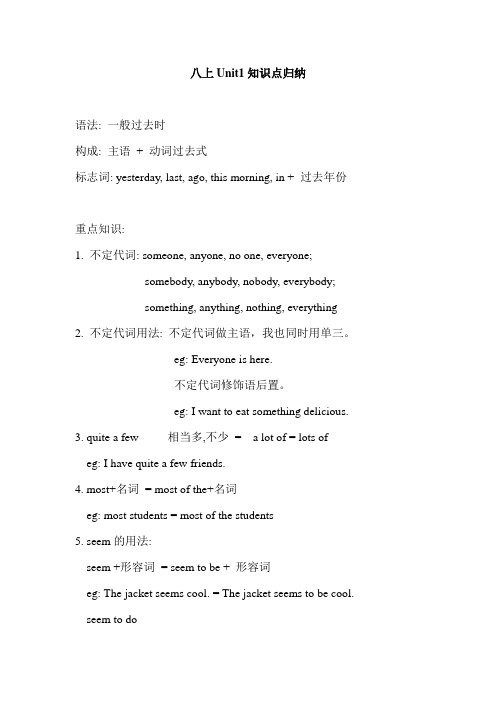
八上Unit1知识点归纳语法: 一般过去时构成: 主语+ 动词过去式标志词: yesterday, last, ago, this morning, in + 过去年份重点知识:1. 不定代词: someone, anyone, no one, everyone;somebody, anybody, nobody, everybody;something, anything, nothing, everything 2. 不定代词用法: 不定代词做主语,我也同时用单三。
eg: Everyone is here.不定代词修饰语后置。
eg: I want to eat something delicious.3. quite a few 相当多,不少= a lot of = lots of eg: I have quite a few friends.4. most+名词= most of the+名词eg: most students = most of the students5. seem的用法:seem +形容词= seem to be + 形容词eg: The jacket seems cool. = The jacket seems to be cool. seem to doeg: He seemed to swim.It seems that + 从句eg: It seems that the jacket is cool.6. bored 厌倦的常用来修饰人boring 无聊的常用来修饰物eg: I feel bored.The book is boring.7. keep a diary 记日记8. decide to do sth 决定做某事儿eg: I decided to learn to play the piano.9. try to do sth 努力做某事try doing sth 尝试做某事eg: I try to learn English well.I tried swimming yesterday.10. feel like to do sth 想要做某事= want to do sthfeel like + 从句给...的感觉, 感受到eg: I feel like to play basketball with friends.= I want to play basketball with friends.I felt like I was a bird.11. build v. 建造, 建筑building n. 建筑物, 房子eg: I want to build a tall building.12. difference n. 差别, 差异different adj. 不同的be different from 和...不同eg: There are many differences between my sister and I.I'm different from my sister.13. on the top of 在...顶端eg: Where is Tom? He is on the top of the hill.14. wait for 等待, 等候eg: I'm waiting for a bus.15. because + 句子because of + 词或短语eg: I'm late because it rains heavily.I'm late because of the heavy rain.16. enough + 名词形容词+ enougheg: We have enough water.The bag is big enough.17. dislike to do sth = hate to doeg: I dislike to eat hamburgers. = I hate to eat hamburgers.。
人教版八年级英语上册知识点总结(全)
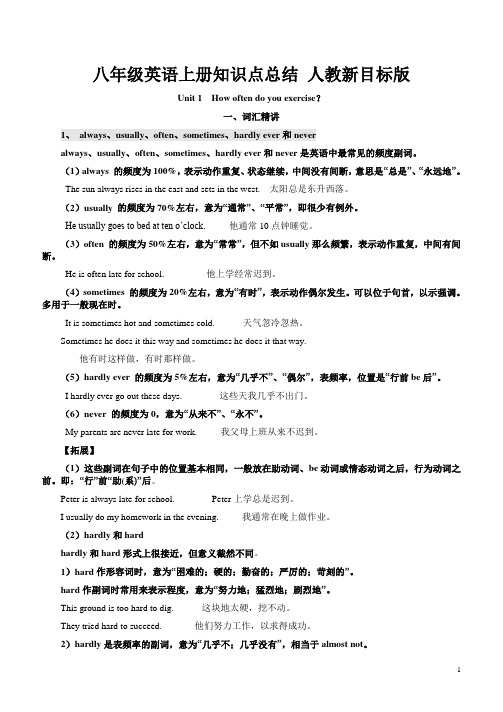
八年级英语上册知识点总结人教新目标版Unit 1 How often do you exercise?一、词汇精讲1、always、usually、often、sometimes、hardly ever和neveralways、usually、often、sometimes、hardly ever和never是英语中最常见的频度副词。
(1)always 的频度为100%,表示动作重复、状态继续,中间没有间断,意思是“总是”、“永远地”。
The sun always rises in the east and sets in the west. 太阳总是东升西落。
(2)usually 的频度为70%左右,意为“通常”、“平常”,即很少有例外。
He usually goes to bed at ten o’clock. 他通常10点钟睡觉。
(3)often 的频度为50%左右,意为“常常”,但不如usually那么频繁,表示动作重复,中间有间断。
He is often late for school. 他上学经常迟到。
(4)sometimes 的频度为20%左右,意为“有时”,表示动作偶尔发生。
可以位于句首,以示强调。
多用于一般现在时。
It is sometimes hot and sometimes cold. 天气忽冷忽热。
Sometimes he does it this way and sometimes he does it that way.他有时这样做,有时那样做。
(5)hardly ever 的频度为5%左右,意为“几乎不”、“偶尔”,表频率,位置是“行前be后”。
I hardly ever go out these days. 这些天我几乎不出门。
(6)never 的频度为0,意为“从来不”、“永不”。
My parents are never late for work. 我父母上班从来不迟到。
(完整版)人教版八年级英语上册第一单元知识点总结

Please bring your book to our school.请把你的书带到我们学校来。
Please take your book to your school.请把你的书带到你的学校去。
14.enough足够(名前形后)
10. feel like意为:“有什么感觉;感受到”,后跟宾语从句。另外,构成短语feel like doing sth.意为“想做某事”。如:
I felt like I was a bird.我感觉我是一只鸟。
I feel like eating.我想吃东西。
Do you feel like ______ (take) a walk in the park with me?你想跟我在公园散步吗?
辨析:①arrive in+大地点/ arrive at+小地点②get to +地点③reach+地点
注意:若他们后面要加地点副词here,there,home等,则不需要加介词。
7.enjoy doing sth .喜欢做…如:Sheenjoys playingfootball.她喜欢踢足球。
enjoy oneself过得愉快如:He enjoyed himself.他过得很愉快。
跟它意思相近的词组还有have a good /great/wonderfultime , have fun。
8. decide意为“决定”,是动词。它的名词形式为decision。构成的短语有:
decide to do sth.
decide on doing sth.决定做某事
make a decision to do sth.
系动词+形容词
新人教版英语八年级上各单元知识点大归纳
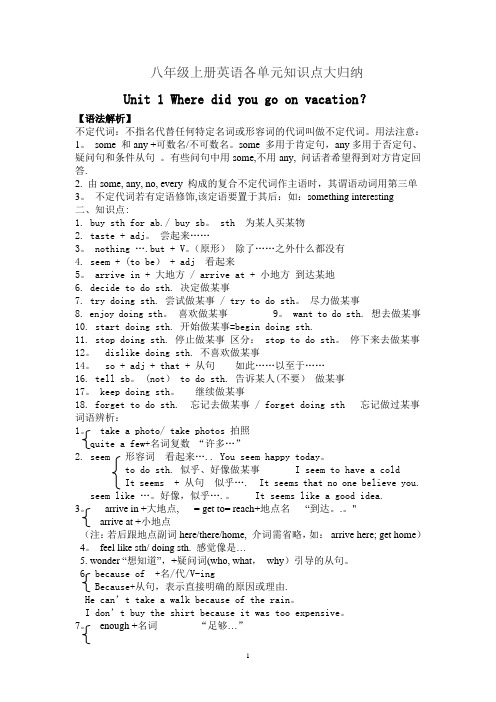
八年级上册英语各单元知识点大归纳Unit 1 Where did you go on vacation?【语法解析】不定代词:不指名代替任何特定名词或形容词的代词叫做不定代词。
用法注意:1。
some 和any +可数名/不可数名。
some 多用于肯定句,any多用于否定句、疑问句和条件从句。
有些问句中用some,不用any, 问话者希望得到对方肯定回答.2. 由some, any, no, every 构成的复合不定代词作主语时,其谓语动词用第三单3。
不定代词若有定语修饰,该定语要置于其后:如:something interesting二、知识点:1. buy sth for ab./ buy sb。
sth 为某人买某物2. taste + adj。
尝起来……3。
nothing ….but + V。
(原形)除了……之外什么都没有4. seem + (to be) + adj 看起来5。
arrive in + 大地方 / arrive at + 小地方到达某地6. decide to do sth. 决定做某事7. try doing sth. 尝试做某事 / try to do sth。
尽力做某事8. enjoy doing sth。
喜欢做某事 9。
want to do sth. 想去做某事10. start doing sth. 开始做某事=begin doing sth.11. stop doing sth. 停止做某事区分: stop to do sth。
停下来去做某事12。
dislike doing sth. 不喜欢做某事14。
so + adj + that + 从句如此……以至于……16. tell sb。
(not) to do sth. 告诉某人(不要)做某事17。
keep doing sth。
继续做某事18. forget to do sth. 忘记去做某事 / forget doing sth 忘记做过某事词语辨析:1。
人教版八年级英语上册语法点总结(最全面)

八年级上册语法点总结Unit1 Howoften doyou exercise?Grammar: 特殊疑问句:wh-questions:what, who, where,when,which,whose, why, whom等。
特殊疑问句的构成及用法:1.结构:特殊疑问词+ 一般疑问句, 即:特殊疑问词+be/助动词/情态动词+主语+谓语/表语(+其他)疑问代词:1) Who:谁。
做主语,用来指人Who is the boy under the tree?2)Whom谁,做宾语,用来指人Whom are you writing to?3)Whose 谁的,用来指所属关系,如果做定语,一般后接名词Whose pen is this?4)Which 哪个,哪些,用来指对人或物在一定范围之内进行选择Whichgrils w illinthesports meeting? Whichpen isLily’s?5)What什么,通常指物,也可指人,一般用在没有指出范围的情况下What canyou see in the picture?Whatareyou doingnow?疑问副词:1)When:何时,询问时间Whenwill shecome back?2)Where何地,询问地点, Where do youcomefrom?3)Why为什么,询问原因,Why are youlatefor school?4)How 如何,询问手段、方式、工具以及程度等How do you usuallygotoschool?5)How old多大,询问年龄,How oldis Jim’s little brother?6)Howmany/much多少,询问数量How many birdsarethere inthetree?7)How far多远,询问距离,How faris it formyourhome to school?8)Howlong多长,多久,询问时间的长度或距离How long will you stay inBeijing?9)How often多长时间按一次,询问频率Howoften do yougo to seeyour grandparents?10)How soon多久,询问时间How soon willyoucomeback?频率副词:表示动作发生的频率,never,sometimes, often,usually, always.Unit 2What’sthematter withyou?Grammar:1. 用have 来描述身体不适have/havegot a+疾病名字;得了……病2.情态动词should,情态动词should,can, may, must没有人称和时态的变化,后接动词原形Unit 3 Whatare you doing for vacation?Grammar:现在进行时表将来一般将来时表示将要做某事或计划打算做某事要用到句型“be+doing”其中be是助动词,它有人称和单复数的变化。
- 1、下载文档前请自行甄别文档内容的完整性,平台不提供额外的编辑、内容补充、找答案等附加服务。
- 2、"仅部分预览"的文档,不可在线预览部分如存在完整性等问题,可反馈申请退款(可完整预览的文档不适用该条件!)。
- 3、如文档侵犯您的权益,请联系客服反馈,我们会尽快为您处理(人工客服工作时间:9:00-18:30)。
Unit 1 Where did you go on vacation?一、词汇与短语● 重点单词A部分1.anyone pron. 任何人2.anywhere adv. 在任何地方3.wonderful adj. 精彩的;绝妙的4.few adj. & pron. 不多;很少5.most adj. adv. & pron. 最多;大多数6.something pron. 某事;某物7.nothing pron. 没有什么;没有一件东西8.everyone pron. 每人;人人;所有人9.myself pron. 我自己;我本人10.Yourself pron. 你自己;您自己11.hen n. 母鸡12.pig n. 猪13.seem v. 好像;似乎;看来14.bored adj.厌倦的;烦闷的15.diary n. 日记;记事簿B部分1.enjoyable adj.有乐趣的;令人愉快的2.activity n.活动3.decide v.决定;选定4.try v. 尝试;设法;努力5.paragliding n.滑翔伞运动6.bird n.鸟7.bicycle n.自行车;脚踏车8.building n.建筑物;房子9.trader n.商人10.wonder v.想知道;琢磨11.difference n.差别;差异12.top n.顶部;表面13.wait v.等待;等候14.umbrella n. 伞;雨伞15.wet adj.湿的;潮湿的;下雨的16.below prep. & adv. 在…下面;到…下面17.enough adj. & adv.足够的(地);充足的(地);充分的(地)18.dislike v. & n.不喜爱(的事物);厌恶(的事物)19.as adv.像…样;如同conj.当…时;如同20.hill n.小山;山丘21.duck n.鸭22.hungry adj.饥饿的● 重点短语A部分1.go on vacation 去度假2.stay at home 待在家里3.go to the mountains 去爬山4.go to the beach 去海滩5.visit museums 参观博物馆6.go to summer camp 去参加夏令营7.quite a few 相当多;不少8.study for…为…而学习9.go out 出去10.most of the time 大部分时间11.taste good 尝起来好吃12.have a good time 玩得高兴13.go shopping 去购物14.of course 当然;自然15.buy sth. for sb. /buy sb. sth. 给某人买某物B部分1.arrive in/at 到达2.decide to do sth. 决定去做某事3.try doing sth. 尝试做某事4.forget to do sth. 忘记做某事5.feel like给的感觉;感受到6.in the past 在过去7.wait for 等候8.because of 因为9.the next day 第二天10.take photos 照相11.find out 找出;查明12.up and down 上上下下● 重点句子A部分1.Where did you go on vacation? 你去哪儿度假了?2.Long time no see.好久不见。
3.Did you go any where interesting? 你去有趣的地方了吗?4.I just stayed at home most of the time to read and relax.大部分时间我只待在家里看书和放松。
5.Everything was excellent.一切都很棒。
6.I bought something for my father. 我给我爸爸买了些东西。
7.How did you like it? 你觉得它怎么样?8.The only problem was that there was nothing much to do in the evening but read.唯一的问题是晚上除了看书之外没有事情可做。
B部分1.I arrived in Penang in Malaysia this morning with my family.今天早晨我和家人到了马来西亚槟城。
2.We decided to go to the beach near our hotel. 我们决定去宾馆附近的海滩。
3.For lunch, we had something very special. 午饭我们吃了很特别的东西。
4.I really enjoyed walking around the town. 我真喜欢在城镇到处散步。
5.What a difference a day makes!一天的差异是多么大啊!6.but many of the old buildings are still there. 但是许多旧的建筑物还在那里。
7.And because of the bad weather, we could n't see anything below.并且因为糟糕的天气,我们看不见下面的任何东西。
8.My legs were so tired that I wanted to stop. 我的腿如此疲劳,以至于我想停下来了。
● 重点单词变形A部分1.wonder–wonderful (形容词)2.many/much–more(比较级)–most(最高级)3.not anything–nothing(同义词)4.I–me–my–mine–myself(反身代词)5.bore–boring(修饰物,形容词)–bored(修饰人,形容词)6.you–you–your–yours–yourself/yourselves(反身代词)7.diary–diaries(复数)B部分1.enjoy–enjoyable(形容词)2.active–activity(名词)3.decide–decided(过去式)4.build –building(名词)5.trade–trader(名词,表示—类人)6.different–difference(名词)7.wet–dry(反义词)8.below–above(反义词)9.hungry–full(反义词)10.like–dislike(反义词)二、语法知识点A部分(1)复合不定代词的用法1、复合不定代词只相当于名词,在句子中可作主语、宾语、表语,不能作定语(即不具有形容词的性质)。
●含-body和-one的复合不定代词只用来代替人,在功能和意义上完全相同,可以互换。
eg. Someone/Somebody is crying in the next room.有人在隔壁房间里哭。
●含-thing的复合不定代词只用来指事物。
eg. Are you going to buy anything? 你打算去买东西吗?2、复合不定代词都作单数看待,如果充当主语时,谓语动词用单数形式。
eg. Is everyone here today? 今天大家都到齐了吗?Nothing is difficult if you put your heart into it.世上无难事,只怕有心人。
3、形容词修饰复合不定代词时,要放在复合不定代词的后面。
eg. Can you tell something interesting? 你能讲一些有趣的事情吗?Did you go anywhere interesting last weekend?上周末你去什么有趣的地方了4、和some, any用法一样,带有some的复合不定代词一般用于肯定句和请求语气的句子中,带有any的复合不定代词一般用于否定句、疑问句。
eg. I have something important to tell you. 我有一些重要的事要告诉你。
Do you have anything to say? 你有话要说吗?●在表示请求、邀请、提建议等的疑问句和希望得到对方肯定答复的疑问句中,也可用含-some的复合不定代词。
eg. Would you like something to eat? 你想要吃的东西吗?(表示建议)Could you tell me something about her?你能告诉我一些关于她的事吗?(表示请求)Why don´t you ask someone to help you?你为什么不请人帮你呢(表示反问)●含有any的复合不定代词也可以用于肯定句中,表示“任何人”或“任何事”的意思。
eg. Anything is OK.什么都行。
Anybody knows the answer. 任何人都知道答案。
练习:一、选择题( ) 1. I´m hungry. I want ______ to eat.A. anythingB. somethingC. everythingD. nothing( ) 2. —Do you have ______ to say for yourself?—No, I have ______ to say.A. something; everythingB. nothing; somethingC. everything; anythingD. anything; nothing( ) 3. Why not ask ______ to help you?A. everyoneB. someoneC. anyoneD. none( ) 4. Everything ______ ready. We can start now.A. areB. isC. beD. were( ) 5. There´s ______ with his eyes. He´s OK.A. anything wrongB. wrong somethingC. nothing wrongD. wrong nothing( ) 6. She listened carefully, but heard ______.A. anyoneB. SomeoneC. everyoneD. nothing( ) 7. I agree with most of what you said, but I do´t agree with ______.A. everythingB. anythingC. somethingD. nothing( ) 8. Everything ______ good.A. beB. areC. isD. were二、用适当的复合不定代词填空。
